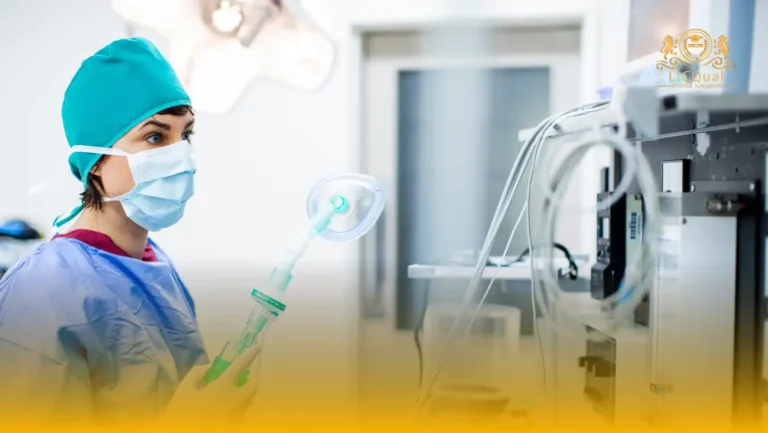The LICQual Level 3 Certificate in Healthcare Data Analytics is a specialised qualification designed for professionals working within healthcare who wish to advance their careers, broaden their knowledge, and strengthen their Continuing Professional Development (CPD). This programme is not intended for fresh candidates but is tailored to learners with some experience in healthcare, data handling, or management, who are looking to enhance their skills in data-driven decision-making.
Healthcare organisations generate vast amounts of data daily, and the ability to analyse, interpret, and apply this information is vital for improving patient outcomes, resource allocation, and organisational efficiency. This qualification provides learners with practical and theoretical knowledge of healthcare data analytics, covering areas such as data collection, data quality, statistical methods, and the application of data insights to support evidence-based decisions in healthcare management.
Centres delivering this qualification must ensure that they meet strict quality standards. This includes employing competent and qualified trainers, providing access to up-to-date learning resources, and creating an environment that supports both theoretical study and practical application. By maintaining these standards, centres ensure that learners receive high-quality training that prepares them for success.
By completing this course, learners will develop the ability to work confidently with healthcare data, apply analytical techniques, and contribute to strategic improvements in patient safety, service delivery, and organisational performance. This qualification equips learners with the skills to play a vital role in shaping the future of healthcare through effective use of data analytics.
Course Overview
Qualification Title
LICQual Level 3 Certificate in Healthcare Data Analytics
Total Units
6
Total Credits
24
GLH
120
Qualification #
LICQ2200716
Qualification Specification
To enroll in the LICQual Level 3 Certificate in Healthcare Data Analytics, applicants must meet the following criteria:
|
Qualification# |
Unit Title |
Credits |
GLH |
|---|---|---|---|
|
LICQ2200716-1 |
Introduction to Healthcare Data Analytics |
4 |
20 |
|
LICQ2200716-2 |
Data Collection and Data Quality |
4 |
20 |
|
LICQ2200716-3 |
Statistical and Analytical Techniques |
4 |
20 |
|
LICQ2200716-4 |
Data Visualisation and Reporting |
4 |
20 |
|
LICQ2200716-5 |
Data-Driven Decision Making in Healthcare |
4 |
20 |
|
LICQ2200716-6 |
Governance, Security, and Compliance in Healthcare Data |
4 |
20 |
By the end of this course, learners will be able to:
Unit 1: Introduction to Healthcare Data Analytics
By the end of this unit, learners will be able to:
- Explain the fundamental concepts and importance of data analytics in healthcare.
- Identify different types of healthcare data, including clinical, operational, and financial data.
- Analyse the role of data analytics in improving patient outcomes and organisational efficiency.
- Describe the main healthcare data systems and technologies used in practice.
Unit 2: Data Collection and Data Quality
By the end of this unit, learners will be able to:
- Describe key methods and sources of healthcare data collection.
- Assess the accuracy, reliability, and completeness of healthcare data.
- Apply principles of data quality management to ensure integrity and consistency.
- Identify common challenges in data collection and strategies to overcome them.
Unit 3: Statistical and Analytical Techniques
By the end of this unit, learners will be able to:
- Apply basic statistical methods relevant to healthcare data analysis.
- Prepare, clean, and organise datasets for analysis.
- Interpret descriptive and inferential statistics to draw meaningful insights.
- Use appropriate analytical tools to support healthcare decision-making.
Unit 4: Data Visualisation and Reporting
By the end of this unit, learners will be able to:
- Apply principles of effective data presentation for healthcare audiences.
- Create charts, graphs, and dashboards to communicate data findings.
- Develop professional reports that support clinical and administrative decision-making.
- Evaluate the effectiveness of data visualisation in influencing healthcare outcomes.
Unit 5: Data-Driven Decision Making in Healthcare
By the end of this unit, learners will be able to:
- Apply healthcare data insights to improve patient care, safety, and resource management.
- Analyse case studies where data analytics informed strategic healthcare decisions.
- Integrate evidence-based practice with data-driven insights.
- Evaluate the ethical implications of using data in healthcare decision-making.
Unit 6: Governance, Security, and Compliance in Healthcare Data
By the end of this unit, learners will be able to:
- Explain key data protection regulations and compliance requirements in healthcare.
- Apply principles of ethical data use in patient care and organisational contexts.
- Identify security risks and implement measures to protect sensitive healthcare data.
- Analyse governance frameworks that ensure responsible and transparent data management.
The LICQual Level 3 Certificate in Healthcare Data Analytics is designed for healthcare professionals, administrators, and career changers who want to gain expertise in data-driven decision-making and healthcare analytics. This course is ideal for individuals looking to analyze healthcare data, improve operational efficiency, and enhance patient care outcomes. Learners will gain practical skills and a recognized certification to advance their careers and professional credibility.
Healthcare Professionals
- Learn how to interpret and analyze healthcare datasets
- Understand data visualization and reporting techniques
- Apply analytics to improve patient care and service delivery
- Identify trends and patterns to support evidence-based decisions
- Enhance decision-making skills with practical data applications
- Gain accredited certification to boost career growth
Healthcare Administrators and Managers
- Improve operational efficiency using data-driven insights
- Monitor key performance indicators for healthcare services
- Develop data strategies to optimize resource allocation
- Implement analytics for staff performance and workflow planning
- Strengthen organizational decision-making with data
- Apply real-world case studies to enhance practical skills
Career Changers Entering Healthcare Analytics
- Build foundational skills in healthcare data analysis
- Transition confidently into analytics or administrative roles
- Learn practical tools for interpreting healthcare information
- Understand patient data management and reporting systems
- Enhance employability with an accredited Level 3 certificate
- Gain hands-on experience for immediate workplace application
Data Analysts and IT Professionals
- Develop specialized skills in healthcare data management
- Apply statistical tools for operational and clinical analysis
- Understand health informatics and regulatory requirements
- Support healthcare teams with actionable insights
- Strengthen analytical thinking and problem-solving abilities
- Gain professional certification to advance your career
Healthcare Entrepreneurs and Startups
- Use data analytics to optimize healthcare operations
- Monitor financial and clinical performance for small businesses
- Make informed decisions on staffing and service planning
- Identify opportunities to improve patient care and satisfaction
- Enhance strategic planning with data-driven insights
- Build credibility with an accredited certification
Centres delivering this qualification must meet the following requirements to ensure effective delivery and high-quality learner outcomes:
- Qualified Trainers and Assessors – Centres must employ trainers with relevant academic qualifications and professional experience in healthcare data analytics, statistics, or healthcare management.
- Strong Quality Assurance Systems – Centres should maintain robust internal quality assurance procedures to ensure consistent assessment, delivery, and learner support in line with LICQual standards.
- Appropriate Learning Facilities – Provision of classrooms, computer labs, or online learning platforms that enable learners to develop both theoretical knowledge and practical data analysis skills.
- Access to Updated Resources – Learners must have access to up-to-date study materials, healthcare datasets, case studies, and data analytics tools or software.
- Assessment Arrangements – Centres must be equipped to deliver and assess assignments, projects, and practical data analysis tasks that reflect real-world healthcare scenarios.
- Digital and Technical Support – For online or blended delivery, centres should provide secure platforms, reliable internet access, and technical support to ensure smooth learning experiences.
- Health, Safety, and Data Security Compliance – Centres must comply with local health and safety standards, while also ensuring data privacy and security during training activities.
- Commitment to Learner Success – Centres must demonstrate a learner-centred approach by providing academic guidance, pastoral support, and access to CPD opportunities.
These requirements ensure centres deliver a professional, high-quality training experience that enables learners to develop strong healthcare data analytics skills and successfully achieve the qualification.
Assessment and Verification
All units within this qualification are subject to internal assessment by the approved centre and external verification by LICQual. The qualification follows a criterion-referenced assessment approach, ensuring that learners meet all specified learning outcomes.
To achieve a ‘Pass’ in any unit, learners must provide valid, sufficient, and authentic evidence demonstrating their attainment of all learning outcomes and compliance with the prescribed assessment criteria. The Assessor is responsible for evaluating the evidence and determining whether the learner has successfully met the required standards.
Assessors must maintain a clear and comprehensive audit trail, documenting the basis for their assessment decisions to ensure transparency, consistency, and compliance with quality assurance requirements.







